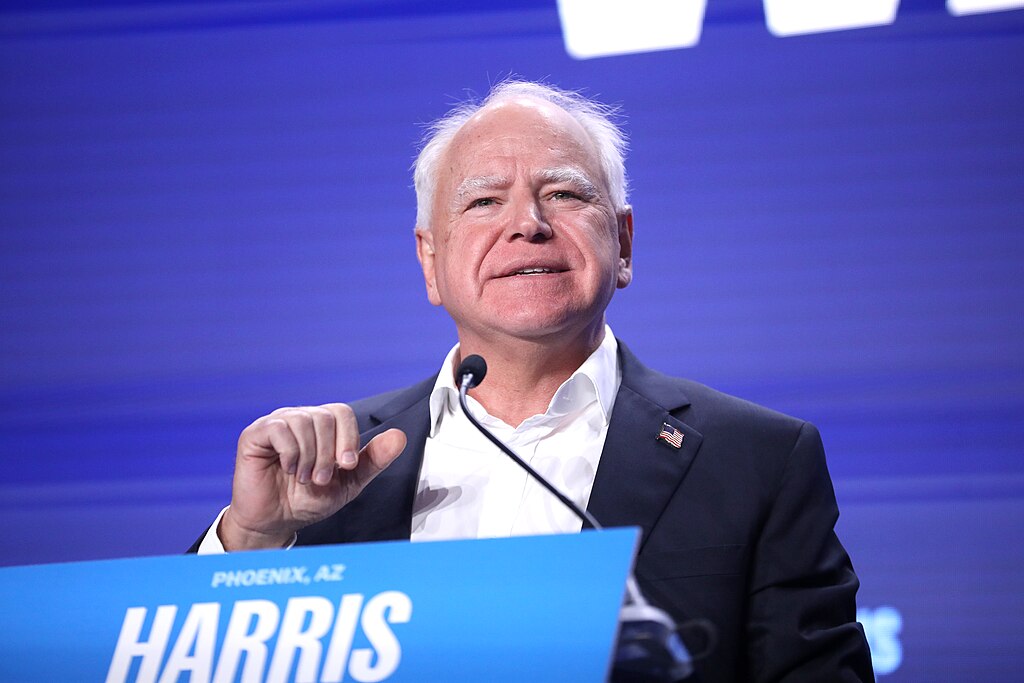Newly leaked Department of Homeland Security documents reveal that Chinese officials had previously identified Tim Walz as a potential target for influence in Washington, even before he was named as a vice-presidential candidate. The internal DHS message, recently obtained through a whistleblower, underscores how Walz may have been viewed as part of China’s broader strategy to secure strategic influence within U.S. political circles.
According to the document, Chinese operatives allegedly marked Walz as a “target” for possible future engagements, suggesting that they saw him as “someone they can get to DC.” The nature of this influence strategy has raised questions and concerns about how Beijing may be working to connect with rising American political figures to advance its interests. The memo hints at a focused effort to place individuals in or close to positions of power within the United States as Beijing seeks more direct influence over U.S. policy.
Analysts who reviewed the memo have pointed out the significance of the DHS warning. By identifying Walz as a figure of interest, China could be looking to establish connections early in politicians’ careers before they rise to national influence. This kind of long-term strategy, which involves approaching individuals before they achieve higher office, may be part of China’s broader playbook in building influence networks within the U.S. government.
The DHS document did not specify particular strategies or agents deployed to achieve these goals, nor did it indicate whether Walz himself was aware of any direct outreach. But the notion of being seen as “someone they can get to DC” underscores China’s vested interest in those who have the potential to shape U.S. foreign policy.
With Walz now in the spotlight as a vice-presidential candidate, his connection to any foreign interest, real or perceived, becomes a matter of intense public scrutiny. Political experts note that China’s tactics may be subtle, involving indirect connections or fostering favorable views among those close to a political figure rather than outright bribery or coercion. However, the acknowledgment of such an interest remains controversial.
A DHS official, speaking on condition of anonymity, said the memo does not imply any wrongdoing on Walz’s part. “This is about understanding how foreign actors seek to align themselves with rising figures in our government,” the official explained. “Whether or not Mr. Walz ever engaged with Chinese representatives is unknown, but the memo clearly shows that China has an eye on future power players.”
Critics of China’s influence operations argue that these recent revelations underscore the need for vigilance and thorough background checks for candidates rising in the ranks. “It’s a global game of chess,” said foreign policy analyst Greg Paulsen. “China wants people in the U.S. government who are sympathetic, or at the very least, not suspicious of its long-term goals.”
Walz’s office has not issued a statement regarding the leaked DHS memo, but the topic has already sparked debate among supporters and critics. As scrutiny on international influence increases, this memo serves as a stark reminder of how major world powers seek to position themselves with emerging American leaders, even before they reach the highest offices in the land.



 Russia Signals Openness to U.S. Security Guarantees for Ukraine at Geneva Peace Talks
Russia Signals Openness to U.S. Security Guarantees for Ukraine at Geneva Peace Talks  U.S. Lawmakers Question Trump’s Iran Strategy After Joint U.S.-Israeli Strikes
U.S. Lawmakers Question Trump’s Iran Strategy After Joint U.S.-Israeli Strikes  NYC Mayor Zohran Mamdani Meets President Trump to Tackle Housing Crisis and ICE Detentions
NYC Mayor Zohran Mamdani Meets President Trump to Tackle Housing Crisis and ICE Detentions  Trump Announces U.S. Strikes on Iran Navy as Conflict Escalates
Trump Announces U.S. Strikes on Iran Navy as Conflict Escalates  Pakistan-Afghanistan Tensions Escalate as Taliban Offer Talks After Airstrikes
Pakistan-Afghanistan Tensions Escalate as Taliban Offer Talks After Airstrikes  Israel Declares State of Emergency as Iran Launches Missile Attacks
Israel Declares State of Emergency as Iran Launches Missile Attacks  Argentina Senate Approves Bill to Lower Age of Criminal Responsibility to 14
Argentina Senate Approves Bill to Lower Age of Criminal Responsibility to 14  Trump Says U.S. Combat Operations in Iran Will Continue Until Objectives Are Met
Trump Says U.S. Combat Operations in Iran Will Continue Until Objectives Are Met  Australian PM Calls Alleged Western Australia Terror Plot “Deeply Shocking” After Arrest
Australian PM Calls Alleged Western Australia Terror Plot “Deeply Shocking” After Arrest  Federal Judge Blocks Virginia Social Media Age Verification Law Over First Amendment Concerns
Federal Judge Blocks Virginia Social Media Age Verification Law Over First Amendment Concerns  Trump Warns Iran as Gulf Conflict Disrupts Oil Markets and Global Trade
Trump Warns Iran as Gulf Conflict Disrupts Oil Markets and Global Trade  Dominican Republic Unveils Massive Rare Earth Deposits to Boost High-Tech and Energy Sectors
Dominican Republic Unveils Massive Rare Earth Deposits to Boost High-Tech and Energy Sectors  UK Accepts U.S. Request to Use British Bases for Defensive Strikes on Iranian Missiles
UK Accepts U.S. Request to Use British Bases for Defensive Strikes on Iranian Missiles  Trump Media Weighs Truth Social Spin-Off Amid $6B Fusion Energy Pivot
Trump Media Weighs Truth Social Spin-Off Amid $6B Fusion Energy Pivot  Iran Supreme Leader Ayatollah Ali Khamenei Killed in Israeli, U.S. Strikes: Reuters
Iran Supreme Leader Ayatollah Ali Khamenei Killed in Israeli, U.S. Strikes: Reuters  U.S.-Israel Strike on Iran Escalates Middle East Conflict, Trump Claims Khamenei Killed
U.S.-Israel Strike on Iran Escalates Middle East Conflict, Trump Claims Khamenei Killed  Pentagon to Halt Ivy League Programs for U.S. Military Officers Starting 2026
Pentagon to Halt Ivy League Programs for U.S. Military Officers Starting 2026 































